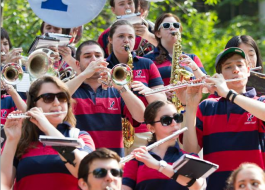 Freddy Chang. Freddy Chang
Freddy Chang. Freddy Chang
Freddy Chang, a sophomore at the University of Pennsylvania, is happily immersed in the heavy course load required of his dual majors in finance and international studies at the Wharton School.
But as much as he's enjoying his second year at the Ivy League school in Philadelphia, he almost gave up his spot in the class of 2019 for financial reasons.
"I knew that there was no way that my family could fully front the cost of attending a private Ivy League institution," Chang told Business Insider.
Chang, who applied early to UPenn in 2014, was initially elated to find out he had been accepted.
But excitement soon gave way to disappointment when he read his financial aid decision letter indicating his family was ineligible to receive any money.
"We would have to front the entire — I believe it was $69,000 — cost of going to school," Chang said. "My heart just dropped when I saw that."
 University of Pennsylvania Via Wikimedia Commons
University of Pennsylvania Via Wikimedia Commons
For the 2016-17 school year, tuition and fees at Penn are $51,464, while housing, dining and other miscellaneous expenses are about another $18,000.
Unsure of what to do next, Chang reached out to NextGenVest, a startup based in New York that helps students navigate the complicated financial aid and student loan process.
The company advised him through negotiating more financial aid — an option Chang didn't know was possible.
While the appeal process differs by school, for UPenn, Chang wrote an appeal letter, submitted extra tax forms, and provided additional teacher recommendations.
It paid off. UPenn reversed its decision and provided Chang $49,000 in aid for his freshman year. It provided the same amount his sophomore year.
Students applying to college can also complete the Free Application for Federal Student Aid, known as the FAFSA. But by accepting a spot at a college and then seeking aid from the government, students are rolling the die on whether they will be granted the money. In Chang's case, he applied to UPenn early decision — before he could submit his FAFSA that year.
"In the end, I was flabbergasted at the amount of aid that they gave us after they said we weren't eligible for anything — to go from zero dollars in financial aid to $49,000 just because you asked," he said.
It's a lesson Chang found surprising, especially since he said he never heard that advice from college counselors. Chang now works for NextGenVest, attempting to pay forward the knowledge that afforded him the opportunity to attend his first-choice school.
He provided a bit of advice for students in a similar situation:
"NextGenVest tells all of its students to write an appeal letter, first of all thanking the university for accepting them, then explaining how they would be a leader on campus but due to the financial aid package they currently have they would be unable to go. ... Fight for your case and tell your story."
Chang stressed that once a college accepts an applicant, it typically tries hard to make sure the student can attend.
"Schools don't want to have any accepted student leave because of financial issues, so I think most colleges, if not all, will try to accommodate to the best of their ability," he said.



